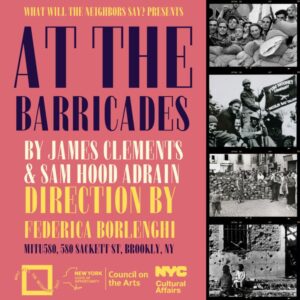International Brigades Play to Premiere in Brooklyn
From June 12 to 29, Brooklyn’s MITU580 will premiere At the Barricades, a new play by James Clements and Sam Hood Adrain set among the international Brigades during the Spanish Civil War. Directed by Federica Borlenghi and supported by script supervisor Skye Pallo Ross, the project was developed through a residency at NYU’s Espacio de Culturas.
James Clements and Sam Hood Adrain are the founding co-artistic directors of “What Will the Neighbors Say?”, an investigative theater company created in 2016 that provokes questions through untold stories. Founded by a collaborative cohort of international artists, The Neighbors present overlooked social, cultural and historical narratives that challenge the audience to reflect on the current moment. Through a combination of original plays, arts education workshops, and dynamic community gatherings, the troupe encourages rowdy and rigorous debate at the theatre and throughout the neighborhood. I spoke with James and Sam in early May.
Tell me about At the Barricades.
The play follows six different characters from the United States, Spain and Scotland, brought together, despite their varied backgrounds, by a shared desire to fight against Franco’s fascist coup. We join them on the outskirts of Madrid in January 1937 and witness, over the course of a year, how their political loyalties, personal relationships and understanding of themselves are strengthened, challenged and irrevocably changed by the tragedy and the carnage around them. In these scary and trying times this new source-based play, drawn from the letters and primary sources of the volunteers, asks the question: how far would you go to protect the freedoms of others?
 Do you have personal connections to the history of the International Brigades?
Do you have personal connections to the history of the International Brigades?
We both grew up knowing this history from family. Sam is Italian American and James is Scottish, so, from different angles, it was on the radar of our grandparents and great-grandparents. When James’s grandfather passed away, the family scattered his ashes in front of the statue of La Pasionaria in his hometown of Glasgow, where his grandfather loved to spend quiet afternoons reflecting on working class solidarity and the city he grew up in. James also used text from Orwell’s Homage to Catalonia in a previous play at La Mama. The themes and era of At the Barricades relate directly to other work the Neighbors have done and, with the state of the world at this moment, now felt like the right time to dive into this documentary theater project.
How has the production process been?
We have been so fortunate to be in residence at NYU’s Espacio de Culturas for the last year to develop this piece. It is deeply rooted in primary source material, and we relied heavily on the resources available in the ALBA collection as well as the wider Tamiment Library & Wagner Labor Archives. The ability to have space to research, write, and develop this piece has been instrumental in putting the play together and preparing for its world premiere in June. Learning about the lives of the volunteers, both in Spain and at home, has been such a joy for us as playwrights and trying to imbue their histories into the characters we have created has been artistically both challenging and deeply rewarding. We have an incredible team of actors and designers working together to really bring the front lines to life and hope that folks will feel transported to 1937 when they walk into the theater.
What does it mean for you to revisit the Spanish Civil War in the United States in 2025?
In a time where free speech, national self-determination and democracy are under fire in the United States and abroad, now more than ever feels like the time to remind folks that the events of ninety years ago are not as distant as they may seem—and that we would be foolish to assume they couldn’t repeat themselves. Indeed, they already are. We hope this piece engenders empathy, encourages solidarity, and acts as a reminder that we are stronger in collective action than our oppressors.













